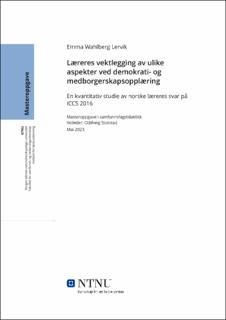Læreres vektlegging av ulike aspekter ved demokrati- og medborgerskapsopplæring
Master thesis
Permanent lenke
https://hdl.handle.net/11250/3084663Utgivelsesdato
2023Metadata
Vis full innførselSamlinger
- Institutt for lærerutdanning [3403]
Sammendrag
Da den nye læreplanen LK20 ble innført i norske klasserom høsten 2020, var det med et tilsynelatende økt fokus på demokrati og medborgerskap. Sammen med bærekraftig utvikling og folkehelse og livsmestring utgjør disse de tre nye fagovergripende og tverrfaglige temaene i den nye læreplanen. På bakgrunn av dette, undersøker denne oppgaven om det er forskjeller mellom ulike grupper av lærere i deres vektlegging av ulike aspekter i demokrati- og medborgerskapsopplæringen. Datamaterialet som benyttes i denne studien er de norske lærersvarene på ICCS-undersøkelsen i 2016. Datamaterialet er i liten grad analysert tidligere.Analysen viser at det er forskjeller, og at de største forskjellene er innad i gruppen av lærere som ikke underviser eller i liten grad underviser i samfunnsfag. Dette viser videre behovet for en tydeligere retning fra myndighetene og læreplanens side når det kommer til arbeidet med demokrati og medborgerskap som tverrfaglig tema i skolen. Oppgaven konkluderer med et økt behov for en mer deltakende og aktiv tilnærming til opplæringen i demokrati og medborgerskap. Ved å ta didaktiske grep, som å basere større deler av undervisningen på diskusjon, samtale og argumentasjon, vil man arbeide med ferdigheter som har positive effekter langt ut over skolen og klasserommet. Det vil, i tillegg til å bidra til å øke elevenes politiske mestringstro, skape et klasseromsklima som oppfordrer til meningsbrytning, hvor ulike perspektiver kommer til uttrykk og blir en sentral del av læringen. For at dette skal kunne praktiseres, er det behov for endringer på strukturnivå, hvor læreplanen gir tydeligere rammer for hva temaet skal innebære, og hvor lærerutdanningen i større grad tilbyr en innføring i hvordan man kan og bør arbeide med demokrati og medborgerskap i undervisning. When the new Norwegian curriculum enrolled the classrooms in the autumn of 2020, it came with an apparently increased focus on democracy and citizenship. Together with sustainable development and public health and life management, these three constitute the new interdisciplinary topics in the new curriculum. On the basis of this, this master’s thesis seeks to examine any potential differences between different groups of teachers in their emphasis on different aspects of democracy and citizenship education. The data material used in this study is the Norwegian teachers’ responses to the ICCS study in 2016. The data material has been little analyzed previously.The analysis finds that there are differences, and that the biggest ones are found within the group of teachers who does not or to a small degree teach social science. Furthermore, this shows the need for a clearer direction from both the government and the curriculum when it comes to democracy and citizenship as an interdisciplinary topic in the schools.The thesis concludes with an increased need for a more participatory and active approach to the training for democracy and citizenship. By making didactical moves, such as basing more of the teaching on discussion, conversation, and argumentation, one will work with skills that have positive effects far beyond the classroom. It will, in addition to contributing to student’s political efficacy, make a classroom environment that invites to conversations based on conflicts in opinion, where different perspectives are expressed and become a central part of the learning. For this to be practicable, structural changes are needed, where the curriculum gives clearer frameworks for what the subject should imply, and where the teacher education on a bigger scale offers an introduction on how one can and should work with democracy and citizenship in their teaching.
